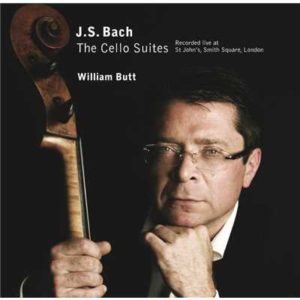
William Butt The Cello Suites (Warner Classics 2564 65422-7) Recorded Live 2009
Firstly, may I offer my thanks to our website visitor who recommended Mr. Butt’s version of the Suites. As William Butt is somewhat of a lesser name in the pantheon of famous performers, this version could otherwise easily have passed us by. In the event, I was to spend a pleasurable 2.5 hours listening to the recording.
William Butt studied under Moray Welsh, and went on to become Professor of Cello at the Royal Irish Academy of Music in Dublin. As a performer he has toured extensively on the international circuit. His performances range widely from the Baroque to Contemporary works. Noteworthy, alongside his Bach recordings are his versions of Britten’s 3 Cello Suites. The latter garnered favourable reviews in the English Press including the Observer and a 5 star review in the Independent On Sunday. His Bach recording was made live (somewhat rare in our website listings), at St. John’s, Smith Square, London, on two dates a week apart. The cello used is not listed in the booklet, but his website states he uses a period Giovanni Grancini (1690) and I have assumed the same applies here. Split over the typical 2 discs, Butt orders them 1,4,5, for disc one and 2,3,6 for disc two. The recording would appear to have been closely miked leading to some intrusive breathing, but fortunately not enough to detract significantly from the experience.
From the outset Butt adopts a moderate pace, and this was to continue throughout his interpretations. Another consistent factor is his surprisingly full rich tone, with him choosing to dig deep into the strings. I had not anticipated this given the usage of a period instrument. The muscular playing made me think of Starker’s Mercury readings, albeit there is none of Starker’s at times excessive momentum or aggression. To be clear, I actually loved the depth of sound Butt achieved, but the quid pro quo was a dampening of harmonic overtones. Sometimes you can’t be all things to all men!
Another aspect of Butt’s readings was he was happy to let the melodies of the slower dances flow into relatively seamless wholes. Conversely, his quicker paced ones were suitably skittish and playful. Whilst freely acknowledging my limitations as a non cellist, I also felt throughout that Butt had a very free flowing bowing arm, which was much to the benefit of the listener. Speaking of which, except for the applause at the end of each Suite, the audience is remarkably quiet. I like to think that this very much reflects how they were engaging with the musical performance as presented to them. I certainly did.
As the Suites progressed, I did note that Mr. Butt was not generally in the business of taking risks by unnecessarily striving to add additional excitement, or even to add his own spin to the music. He was merely trying to communicate what Bach had written. He did use tasteful ornamentation where the music called for it, and rubato was also sensitively, if sparingly, applied.
In the interests of balance to my review, I did feel (alongside the previous comment indicating his style masked some of the overtones in the pieces) that he could have used more dynamic variation in performance. However, this is a minor quibble.
It may be noted that I have not made specific references to individual Suites of the movements within, despite the fact that I did in fact write notes during my listening sessions for all of them. However, as I found a remarkable consistency of vision throughout, I have on this occasion deemed it superfluous – for which I can only apologise if this proves a disappointment to readers. I can add that Butt’s playing of the Suites is technically very assured, especially given the recording is live (with the possible exception being the beginning of Suite 6 where I thought the intro was slightly smudged).
Conclusion.
In terms of where to place this in the pantheon of reviewed recordings I would say it is less exciting or imaginative than Watkin’s superlative traversal, also performed on a period cello. However, for listeners seeking an entry point into the Suites, and who prefer the sound of older cellos, I would give Butt a hearty recommendation as a very safe and enjoyable bet.
Mark.